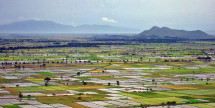In November, TNI/BCN hosted a two-day seminar, involving ethnic groups from different regions of Burma, on the theme of “Ethnic Conflict in Burma/Myanmar: From Aspirations to Solutions”. Those participating included 20 representatives from Burmese civil society, political and armed opposition groups.
The meeting occurred during an important time in the country’s political transition. International recognition for the reform agenda of the government of President Thein Sein is increasing. Asian governments are maintaining their economic priorities for Burma’s political future, while Western leaders are promoting a combination of political and economic engagement. Ex- US president Bill Clinton, ex-UK prime minister Tony Blair and EU foreign policy chief Catherine Ashton all visited the country in mid-November. As a result, a major escalation in Western aid appears imminent.
The European Union alone is reportedly proposing an increase in annual aid from 19 million to 90 million Euros a year. The view from Burma’s peoples on the ground remains very cautious. As the doors to the country open, there is undoubtedly greater freedom of speech, modernity and social mobility. Such changes are welcome.
However, after over 30 months of the Thein Sein government, political transition continues to be military-dominated and top-down, with essentially the same ruling elite in political and economic authority as under the former State Peace and Development Council (SPDC) regime. Hopes remain that, through political negotiation, democratic reforms will be achieved which lead to just and inclusive solutions. But as the countdown to the 2015 general election begins, concerns are growing that essential reforms will not be delivered.
In particular, a critical stage has been reached in discussions over constitutional reform and ethnic ceasefires. For the moment, there are no indications as to how such key national issues will be resolved. In the meantime, many citizens say that they have seen no improvement in the quality of their lives; land-grabbing and economic grievance are increasing; and the number of persons internally-displaced by violence have grown by around 240,000 since the 2011 change of government to an estimated 649,000, exacerbated by conflict in the Kachin region and anti-Muslim violence in several parts of the country.
The seminar focused on four main areas: political reform; moving from ceasefires to political dialogue; land rights and natural resource extraction; and ethnic identity and citizenship.
photo by Greg Walters

